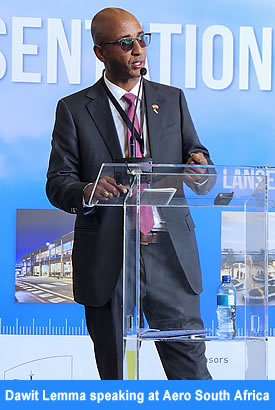 |
Our series, African Skies, will explore the ongoing evolution of the African business aviation community from diverse perspectives. Aviation in Africa is changing, and the African Business Aviation Association (AfBAA) is working to ensure that it represents the entire community as it enters a new era.
This is an exciting time for aviation in Africa. The spending power of the rising middle class, the growth of new industries, and the introduction of initiatives such as the African Continental Free Trade Area (AfCFTA) are actively encouraging trade and travel.
Across the continent, modernization of infrastructure and safety standards, and a growing demand for more diverse services, including medevac, drone delivery, and private aviation, are supporting economic development.
This presents both opportunities and challenges for the growing business aviation community, and, as their representative body, AfBAA is taking steps to ensure its members can fully leverage the benefits of these changes.
I took on the role of Chairman of AfBAA in May 2025, having been involved since the organisation’s inception. Over the last decade, I’ve also held active association roles, including serving as membership director and a board member. A Swiss citizen of Ethiopian origin, I have lived and worked all over the world - from Zambia to Afghanistan, the USA to Switzerland - and can bring the perspectives of a global citizen, an international outlook, and hands-on aviation experience to this new position. I feel a deep connection to this unique environment and, with my own aviation business based in Addis Ababa, bring a genuine understanding of the sector across Africa and beyond.
 Beside me, helping to drive the association, are Vice Chairperson and Chairperson of the Governance Committee, Craig Middleton, who also runs his own aviation consultancy. Craig has over 30 years of expertise in aviation management, strategic business development, and operational leadership, and has also been part of AfBAA since the beginning.
Beside me, helping to drive the association, are Vice Chairperson and Chairperson of the Governance Committee, Craig Middleton, who also runs his own aviation consultancy. Craig has over 30 years of expertise in aviation management, strategic business development, and operational leadership, and has also been part of AfBAA since the beginning.
We want to see aviation become the great connector of the continent - economically, socially, and politically. To support these endeavors, there are several areas to tackle, which is why we’ve set out some immediate objectives and plans to increase the association's visibility, foster a positive perception of the sector, and strengthen AfBAA’s influence by welcoming new members from within Africa and beyond.
We know that our members rely on us to lobby on their behalf, identify common issues that need to be resolved, and act as a single voice with regulators, industry, and international organizations. Identifying the main concerns and creating strategies to resolve them is at the top of our list.
To do this, we have already improved communication between the executive and our members, as well as with the rest of the world. We’ve already made inroads with international business aviation associations and have participated in major events. At Aero South Africa, we led a safety and training symposium. At Africa’s premier aerospace event, Aviation Africa, we hosted the African Pavilion to showcase the potential to international delegates by providing a platform for our members to exhibit. This provided us with the opportunity to initiate conversations with influential stakeholders, including AfCAC, CAASA, and AASA.
We’ve also attended major international meetings such as EBACE and NBAA, and will continue to raise our profile at global gatherings. We need to do this to change global perceptions of African aviation and to build and showcase the benefits of doing business with African aviation companies.
 Business aviation in Africa is far from being just luxury jets or presidential flights - it’s air ambulances, anti-poaching aircraft patrolling with helicopters and small fixed-wings, humanitarian aid, and the farmers in their Cessna 172s, flying from fields to trading posts. It is fuelling commerce, health, and security, and driving economic growth.
Business aviation in Africa is far from being just luxury jets or presidential flights - it’s air ambulances, anti-poaching aircraft patrolling with helicopters and small fixed-wings, humanitarian aid, and the farmers in their Cessna 172s, flying from fields to trading posts. It is fuelling commerce, health, and security, and driving economic growth.
A key priority for this year is to encourage the General Aviation (GA) and rapidly developing UAV and AAM sectors to engage with AfBAA. The GA sector is core to aviation in Africa, so AfBAA is actively encouraging GA stakeholders to participate in the association alongside our business aviation colleagues.
In addition, we look forward to welcoming members from the new and rapidly developing UAV and AAM sectors and helping them to work alongside their more traditional colleagues to the benefit of the entire industry. To support this new membership sector, AfBAA launched its RPAS Committee in September. Dedicated to UAVs and Advanced Air Mobility, it is focused on encouraging the inclusion of remotely piloted aerial systems (RPAS) within our aviation network.
Africa presents significant opportunities for this emerging segment and has become a testbed for many next-gen aviation operations. Our lack of traditional transport infrastructure, combined with our vast distances, makes UAVs a natural solution to many transport challenges.
The association wants to safeguard good governance across all areas to ensure its future stability and longevity and has set up a committee to that end. Committees focused on training, safety management, and infrastructure improvement, as well as on identifying ways to attract new human resources to the industry, are also now evolving.
For decades, Africa was dismissed as the “dumping ground” for older aircraft. That narrative is outdated.
Today, Africa is an important business aviation market. With our new executive, we are committed to showing that the world cannot afford to ignore the opportunities within African skies.




